Interview with Scott MacKenzie
Some of you might perhaps remember Scott MacKenzie from the PDC World Championship 2011. He had qualified to represent "Greater
China" and met in the preliminary round German player Jyhan Artut.
Scott MacKenzie lives in Hong Kong and is originally British, but you'll hear more about it in the interview.
But the topic of the interview is not only the quite unusual person Scott MacKenzie, one can find out a lot about the rapidly growing dart scene in Asia and about the
differences between Steel-Dart and Soft-Dart. Scott plays both and in both counts to the top players in Hong Kong what really is an achievement.
And should Scott one day decide he doesn't like darts any more he could turn to snooker and pool which he both plays with the same skill as darts...
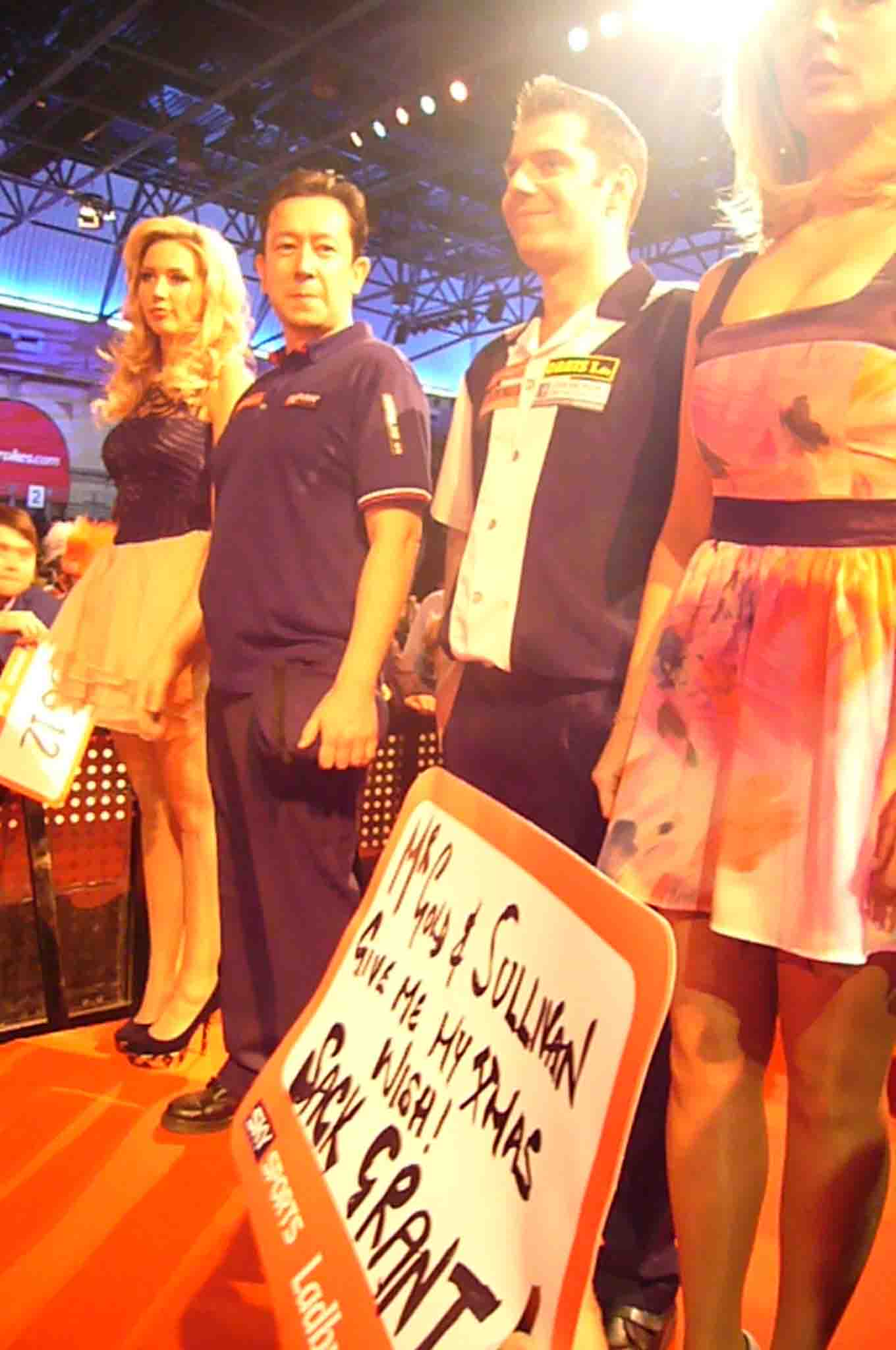
Scott - you are some kind of a "global" dart player - you were born in Brazil, your father is Scottish, your mother from Japan and you now live in Hong Kong - which nationality have you got?
Haha, yeh I guess I could play for the United Nations - I like to use the word 'cosmopolitan', in theory I could represent any of those countries (if I was good enough), I am a UK national but I have lived in Hong Kong since 1996 (15 years) and I am a Hong Kong permanent resident and I do now consider myself a 'Hong Konger'.
Where did you grow up?
I lived in Brazil until I was 6, then moved to Scotland for a couple of years then we moved down South, to Essex, quite close to London, until I was about 24 years old. So I've lived in England about the same amount of time I have lived in Hong Kong.
How and when did you get in contact with darts?
I loved watching darts on TV, my era was Eric Bristow, Jockey Wilson, John Low, Cliff Lazarenko etc they were showman, big personalities, it
was pure entertainment. In those days the players could still smoke and drink on stage, I was watching when Jockey fell off the stage as he had
a few too many during his World Championship match with either Eric or Dave Whitcome in the late 80's. Luckily our house in England was big
enough to have a 'games room' which had a full size snooker table and dart board in it (it also had a bar and fruit machine - it was like my
own personal pub).
I loved playing both snooker and darts, I was around 9 or 10 years old and I became fascinated with the game - you know to try and emulate my
heros . . .Jocky Wilson, Eric Bristow in darts and Alex Higgins in snooker - probably not the best role models to have, but there is something
really likeable about 'imperfect heros' you know even superman had kryptonite, with Jocky and Alex it was alcohol and Eric maybe his arrogance -
I found them great characters.
You passed some time in England to study chemistry - were you at that time already at home in Hong Kong?
At that time, home was still the UK, that has now changed to HK. But at the time I was pretty much an 'Essex-boy' minus the Capri - instead I had
an MG. I studied both a BSc and MSc in Chemistry at Kent University in Canterbury, I loved the lab work, the experiments - blowing things up.
After University I worked for Southern Water as a scientist for a short time before heading out to Hong Kong. I started work as a science editor
for Macmillan publishers after a couple of years I became Chief Editor of one of the biggest read science and technology magazines in Hong Kong.
I then had a short stint as an environmental consultant which I really enjoyed, I now work in the finance industry.
Did you play darts while studying in England?
Occasionally, but not really that much I was too busy doing other things - parties, girls and of course studying. I regret not playing more darts as there were a lot of dart boards around the local pubs in Canterbury. But on the occasion I did play and I found myself beating my friends really easily. I guess it's a little like riding a bike. I had played from the age of 10 to around 18 years of age, 1 or 2 hours a day, so I had a good base.
And would you say you know the British darts scene and some of the players? Not really, I know mostly the Asia Players. I've met some of the top players in the UK but not really played against many of them. I do still watch a lot of the matches on satellite but I'm also quite busy at work - I work full time. A lot of my free time I play, rather than watch.
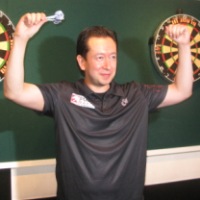
Did your "British roots" help you when you played in December in Alexandra Palace?
Not really. I only really knew Hashimoto from Japan - but we couldn't talk that much as even though I'm half Japanese I never learned to speak it, and Hash can't speak English that well.
How would you describe that World Championship experience?
Fantastic. Loved every brief second of it.
Funnily my nickname 'The Alchemist' came about because I normally switch darts during a match to a gold set for a bit of fun - the name came
about because you know 'turning tungsten to gold' . . .and with a Chemistry degree, anyway I was going to switch to my gold set for my last
throw, where I had 56 left but under the pressure with the camera's etc I forgot to swap . . .anyway I missed 2 darts at tops and a chance
to meet Denis Ovens in the next match. I really enjoyed the game and the crowd was fantastic.
Who did organise last year the Chinese qualifier for the PDC World Championship and have you an idea whether it will be organised again?
Funnily, I approached the PDC a couple of years ago to see if they could offer a spot at the WC to someone from Hong Kong, at that time it fell
through but last year we did manage to hold it. The PDC approached Steve Lewis from Unigroup. Steve then approached me to see if I could help
him run it, as I expressed an interest before. I thought it about time Hong Kong players got noticed a little - there was 3 or 4 players I
believed good enough to represent Hong Kong and have a decent chance.
Royden Lam who is the only full time dart player in Hong Kong (2009 Hong Kong Open Champion, runner-up in the 2010 Japan Open), Alex Hon
(previous Hong Kong Open winner) semi full-time player from Macau, and of course myself. It was good fortune that not only did I help Hong
Kong organise the event but that it was I who won and would have the honour of being the 1st ever Hong Kong representative at the PDC World
Championships. I hope there will be other opportunities.
Was it hard to qualify?
Yes it was. The eventual top 4 included Royden, Alex, another local player and myself. Alex beat Royden and I also made it to the final. And
the match was poised at 3-3 in the final (best of 7), luckily for me I had the throw and also Alex had 2 bounce-outs which really cost him,
I won the match 4-3.
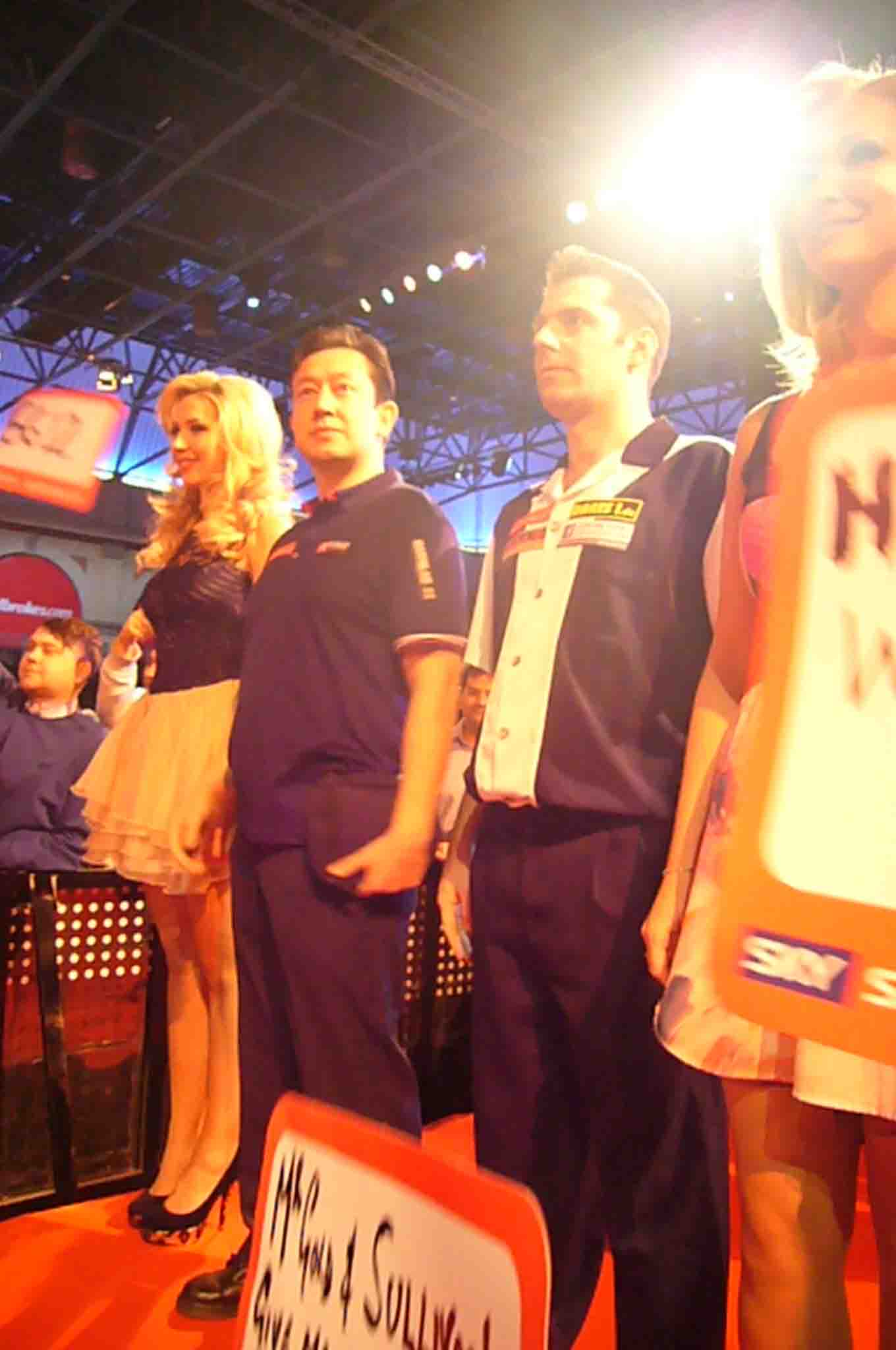
I don't want to call it destiny but when I was 18 in the UK I was watching the 1990 World Championships and I had a real feeling that I would
go there one day and play in the event - I hadn't even planned to go to Hong Kong then at that stage and my darts ability was good but not great,
so I shrugged it off as more of a dream than a premonition . . .but I also had a strange feeling as I was watching Paul Lim hit his 9-darter that
I would play Paul (I actually played Jyhan Artut) - but I now play Paul Lim regularly as he's in my darts team in the local Hong Kong league, as
he's now semi-based in Hong Kong! Paul also told me that he nearly went to play in the last world championships, he just missed out by 1 place!
How many players took part in the qualification?
About 40 in all, around 10 from China and the rest from Hong Kong and 1 from Macau. I think the PDC tried to get a Chinese player at the last WC, but there were some problems with that in the end, and they thought having a 'Greater China' qualifier would open up the opportunity a little more.
You play most of the time in Asia and probably know a lot about darts in Asia. Is darts popular there?
Yes very. It's getting crazy here. Believe it or not I'm a mini celebrity here in Hong Kong, rarely do I have a day without someone coming up
to me to say hello and having a chat about darts, it's a close-knit community here. Steel tip is popular but with soft tip it's another dimension
completely. There's something like +1000 soft tip dart machines in Hong Kong and literally hundreds of bars. It's also popular in Korea, Taiwan
and Singapore but in Japan it's gone supernova, with over 1 million registered soft tip dart players there.
I recently went to play a tournament in Japan, myself and a few friends went into a local club to play - there were around 50 darts machines and
all were taken - we had to wait about half an hour before one was free, this was at 5pm - it got busier later in the evening! It's also
extraordinary because you have to 'pay to play', something which I think in England would be unheard of - darts in the UK are free, ok you
may buy a beer or two but essentially to play a game of darts costs nothing, and it's the reason I think soft tip darts hasn't taken off in
the UK. But because you pay for the games (in soft tip) this allows the bars and manufacturer of the machine to generate a lot of income,
this enables them to hold big money tournaments. I get sponsored, so most of the games are free for me but people regularly put in 20 or 30
pounds each for a couple of hours.
You can read a little more about it in the Dartoid's Column where I recently wrote a brief article about the soft tip game in Hong Kong. There's
one tournament which is giving out 1 Million Hong Kong Dollar for the winner (about 80 thousand pounds) - next year the prize money will
be bigger than the PDC World Championships, and that will only be the second year that the competition will have been running - imagine what the prizes will be in the next few years! The centre of darts is moving to Asia.
When you compare the skill level of players in Asia and that of the dominating players in Europe how would you assess the players from Asia?
It's getting closer all the time. If you compare the averages of players there are 5 or 6 Asia players that can easily be in the World top 16. This includes Lourence Ilagan from Philippines, Morihiro Hashimoto from Japan, Jaypee Detablan from Philippines (who's only 20 something), Ronald Briones also from Philippines, Royden Lam from Hong Kong, there's also Tengku Shah from Malaysia. It would be a shame not to mention Shi Yongsheng from China but he's faded a little recently. Paul Lim is still around and still plays great, I know he's planning try to get a spot at the next World Championships.
And where do you think the best players in Asia come from?
Purely Asia (disregarding New Zealand and Australia who I know have a lot of good players) I think it's the Philippines, Japan, Hong Kong and China, in that order. Each country has full time professional players who regularly hit +100 averages in steel tips.
Paul Seigel=Dartoid tells us for years players from Asia are the upcoming force in darts - would you agree with him?
Yes! Did you know that some schools in China are teaching darts as a sport to 10 and 11 year olds? Schools! The money is getting bigger and bigger
and that's getting a lot of people's attention. I predict there will be an Asian winner of the PDC Darts World Championships within the next 3 or
4 years - if and it's a big IF, more Asia players can get the chance to play there. At the moment there's only 3 or 4 and that's not enough.
I know a lot of players from the Philippines for example that can't afford to go abroad or even to take time off work to play in international
tournaments, so they can't get noticed or get ranking points. I recently played in the Philippines and there were boys there 12 and 13 who are
hitting 180's practically every other throw - it's amazing to watch.
Is there more soft darts or more steel darts played?
Soft. You also have a great deal of choice as a player - you have Dartslive, Medallist, Arachnid and Phoenix machines - all these are different manufactures and they are all trying to be the no.1. So they each organise many tournaments, so many in fact competitions often clash with each other.
I think you yourself play both???
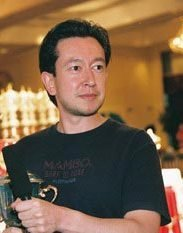
Yes. But as the money is so good in soft tips if an event clashes, I'll generally follow the money. There are also many more soft tip tournaments than steel tip here - in fact they are daily. The title is also important, there is a annual soft tip tournament in Japan called "MJ" there is no prize money, but winning is very highly regarded, it was won by a friend of mine in Hong Kong, Royden Lam last time around.
There is always in Europe and America the debate what is in the end the superior of the two and very often "serious" dart players disapprove of soft-darts - players from Asia seem to be more open. Is that really so???
There still is a stigma with soft tip darts especially in England I think, maybe stigma is too strong a word - I think people think it's like
playing 'toy' darts, and as mentioned you have to pay for games which people don't like. It's also because soft tips are an 'off-shoot', it's
not strictly the 'pure' game. But compare snooker and pool, tennis to table tennis, football to beach soccer. Games evolve with the times, and
times they are a changing. Soft tip darts have much more flexibility than the 'pure' game. Games can automatically be handicapped, the machines
also keep all your data like points per dart, dart averages, high scores and win/ loss % - so you can see if you are improving.
This also only scratches the surface of what the soft tip darts machines can do. Since they can be connected via the Internet, you can play people
anywhere on the planet - if you had access to a machine in your local bar I could give you a game of darts tonight in real time - and don't think
you can just stand there pressing the T20 or bullseye with your finger - there are cameras so we can actually watch each other very clearly. Also
as mentioned the money is getting bigger and bigger, people are coming from all over the world to play in soft tip competitions and the events are
televised, it's serious business, you can become a multi-millionaire by playing soft tip darts.
What do you yourself prefer?
I'm in the middle, I love both. But soft tips are so convenient to play as the machines automatically deduct the scores, you don't need a chalker for example and to play darts 'cricket' it is a lot easier to work out what you have left if you play on the machine. Also the soft tip machine has the ability to automatically handicap a game if you play a weaker player. As all the data of all your games are recorded (via your own personalised card) the machine will - if you play 501 - start the weaker player on maybe 392 or less depending on their and your statistics, this guarantees a close game as it's all mathematically/formula based.
And what for you is the main difference?
A friend of mine once said that "soft tip darts are so difficult because it's so easy". Let me expand a little on that, soft tips darts are much
easier to play as the target sections are bigger (bigger treble, bigger double and bullseye) it's easier to score 100 for example, so this
equalises the game for everyone - your average in soft tips will naturally be higher than steel tips as the target sections that score higher
are bigger.
But it means that it's easier for everyone - it's like making the goal posts in football wider - which means that it's easier to score. A much
better player will win in a steel tip match, but in soft tips sometimes a better player on paper will lose.
Do you think a good soft dart player will be a good steel dart player as well or might be the other way round: when you are a good steel dart player you'll be a good soft dart player as well?
A good steel tip player will likely be a very good soft tip player, but not necessary the other way around - a good soft tip player may not be a good steel tip player. There's only 1 exception, because in soft tips there is a limit to the weight of the dart - maximum of 20g, so if you are a steel tip player that likes to use a heavy dart, say +28g it may be a struggle to get used to soft tips - it could be a reason why Phil Taylor hasn't excelled at soft tips, as much as say John Part has, as he normally uses 26g darts, but I know he doesn't play it often.
Would you say soft dart is in any way easier then steel dart? (Yes, answered above).
I read playing soft dart you'll use other outs - because of the size of the bull bullseye finishes are the common way players use - and that because of this your scoring to get there will be different as well - is that true?
Yes. Scoring and outs are different, the percent out is different. It's basically hitting the bigger target area, as the bull is bigger than the
double in soft tips - the outer and inner part of the bull normally both score 50 in soft tips, it's best to hit the bull instead of the T20
for scoring.
In an 101 out for example, generally you would hit T20, S9, D16 in steel tips but in soft you would normally hit bull, S1, bull (you can also
sometimes win by hitting a treble in soft tips too depending on the game - this is called to 'master out', so I would hit bull, T17, if I miss
the treble and just hit S17 then I still have a shot at D17 to win).
Does there exist a Chinese national organisation at all? Or any organisation?
There are different groups in China, but currently they haven't registered with either the WDF or PDC as far as i know. The IDF (International darts federation) does organise some tournaments, and seem to be the main organisation working in China at the moment. It's quite bureaucratic in China so it can be difficult to get things done with darts there.
Hong Kong is member of the WDF - is it in darts still independent from China?
Yes, luckily.
Are there leagues and dart pubs in Hong Kong might be even as some kind of British relicts?
Haha, yes many. A lot of familiar pub names like the Railway or Kings Arms etc - Hong Kong was a British colony for a long time and I don't think it will ever lose that 'Britishness'. The darts society was started by the Brits.
I read you are sponsored by Puma - is Puma the dominating darts manufacturer in Asia?
They are quite big over here, they do a lot to support darts in Asia, I met Peter McCormick in New Zealand while playing in the Asia Pacific Cup, he's a nice guy and very supportive. I've also recently been approached by Cosmo Darts and are now also sponsored by them.
Or are the big British manufacturers like Unicorn, Target, Winmau around as well?
Yes they are all here, plus others. I know some people that run darts shops in Hong Kong and Japan, darts and dart supplies are selling like hot cakes.
Do there exist any other Asian manufactures beside Cosmo?
Cosmo Darts are great - I recently became sponsored by them, they do a product called
"Fit Flight" they are something that most of the top
players are now using as they have reduced deflection - which is essential in soft tips and they also last much longer. There are many Japan
manufacturers, DMC who sponsor Paul Lim are here, Tiga sponsor Masa Lui who is 14 year old kid and a Hong Kong star of the future. There is a
brand from China called '180', they sponsor Royden Lam.
Are there many steel-dart tournaments in Asia at all?
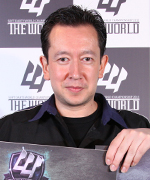
Yes, every Asia country does an annual WDF Open, the Philippines have quite a few more as they get a lot of sponsorship from Manny Pacquiao who's a big dart fanatic. And the PDC of course do qualifying for the World Championships.
At the moment there is a big soft-darts tournament series played in Hong Kong - who organised it?
That's organised by "The World" committee, which is headed by The Dartslive Group, a Japanese company with strong links to the software / games company Sega. In Hong Kong it is headed by Steve Ngu, who is our version of 'Pacquiao' - he is a wealthy guy that is supporting the darts community here really well, he made his money from the sports equipment industry in Asia. You can often see him drive around in his Lambo or Hummer in Hong Kong.
And can you tell us a little bit more about it - how many tournaments are played, how much price money will be paid, how many players take part, what kind of tournaments are played?
It is played in eight stages and the Grand Final. On the day before every stage a shootout is played which decides over the seeding. The shootout is a little like playing "around the clock" but it's played with a multiplier which makes it tricky. The tournament format is best of five: 701, Cricket, 701, Cricket, Choice. The price money for the winner of each stage is 100 000 Hong Kong Dollar while the winner of the Grand Final will get 1 000 000 Hong Kong Dollars. The Top 48 players from the overall ranking are seeded for the Grand Final and they are joined by 16 qualifiers out of the ranks 49 - 100. (ansered above) would recommend to read the Dartoid column or visit the world website for all the info: http://darts-theworld.com/en/index.html.
One can read the price money is quite high - where does it come from?
The Dartslive Group - a machine manufacturer - earns quite a lot with soft-darts and recycles some of the money through the tournaments back to the players.
Do European or American players take part?
A handful of Americans / Canadians have entered (John Part, Scotty B, Chris White and Robert Heckman, Dave Fatum said he will come for some of the stages as has Ray Carver), no-one from Europe as yet!
Do you take part as well?
For sure.
I read somewhere there is a stream available for the tournament?
Yes on 'Ustream' there's a link on "The World" website,
Can you in Asia anywhere follow darts on tv? Or only stream?
There are many ways to watch darts, they do have matches on satellite here and some more recently on domestic tv. ESPN apparently will be showing 'The World' events shortly. Of course mostly people watch the recorded games on youtube and from other websites online.
Do you have any idea how well-known players like Phil Taylor or Martin Adams are in Asia?
Martin Adams is not so well know or in fact any of the BDO / WDF players, but everyone knows the PDC players. If you are keen on darts you'll know Phil Taylor's name no matter what country you are in.
Do those players ever travel to or through Asia?
Not often. John Part has and is probably the biggest name of the PDC players to have consistently come out to Asia. Gary Mawson has come out too.
Who would you think would be role models or idols for dart players in Asia?
It's mainly the top Asia players, especially the Japan players such as, Hashimoto, Eguchi, Taro Yachi, Hoshino etc they are very respectful when
playing either winning or losing.
And of course there is Henry Ho. You might not have heard from him but he's well know here in Asia and by the old boys like Bristow and John Lowe
as well. He died a few years ago. Atz one time he was in the top ten of the WDF ranking - the highest ever ranked player from Hong Kong and some
kind of grandfather of darts in Hong Kong. Every year we hold a Henry Ho cup - he was a great ambassador for darts in Hong Kong and Asia.
Probably it is not really easy to find a sponsor - how did you manage it to be sponsored by Puma?
It's getting easier and easier - there's no question that darts and darts supplies are selling more in Asia than anywhere else.
What is you profession?
Investor Relations Manager for a well known hedge fund.
Would it be possible for you to earn your living from darts - are there any professional dart players in Asia?
Of course it would be possible. There are several full time professionals in Asia already.
Do you travel a lot to take part in tournaments?
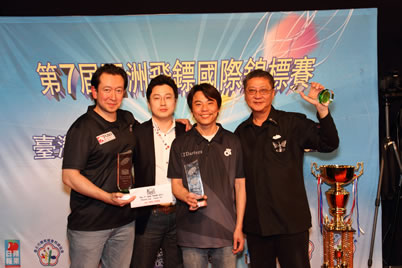
It varies from year to year, but I need to coordinate it with work - but normally 4 or 5 times are year.
What for you was your biggest achievement so far and did you set yourself goals - perhaps like returning to the PDC World Championship?
Winning the Hong Kong open for me was a big achievement last year, some well known names have won that in the past. I also captained the Hong Kong team to the WDF Asia Pacific Cup in 2008 which was a real privilege. But being part of the PDC World Championships will always be special and I would be delighted to return.
In England at the moment one talks a lot about more professional ways in darts practice like in other sports and about darts academies - is that in any way an issue in Asia?
I'm a little unsure of the question - darts for me is all about practice, practice, practice, but having a strong mind and training the body will help for sure. But if you look at the physique of the best players in the world over the years you can see a common factor - you don't need to be Usain Bolt or Lance Armstrong (pardon the pun) a strong arm would help . . .
The national darts organsisation for Australia - darts australia - sees an important part of it's work in coaching as well - how is it in Hong Kong?
It's a little different here - beginners find a dart player that they like and approach them to see if they can train them - it's exactly like in martial arts / kung fu in Hong Kong, you have a master (sifu in Chinese) and your students. There are many dart sifu's in Hong Kong.
Do you practice yourself and what do you practice?
Yes, everyday. Normally in the morning for half an hour, I often also go home at lunch and practice an hour, then after work for an hour or so,
so around 2 hours per day. I would like to do more but I have time constraints with work.
Everyone has their own routine, and I have read John Part's and John Lowe's advice on training - mine is similar. As Paul Lim would say, it's
developing that 'muscle memory'.
And are you interested in those new ideas - in sports psychology perhaps?
Sort of. Having a strong mind really does help. If you believe in yourself I think you can achieve anything you want. I have read books like 'The Secret' by Byrne and the 'Power of Now' by Tolle and even more extreme books by David Icke, they all have a common pattern - you can achieve anything you want to achieve.
Is your practice for soft-darts and steel-darts the same or does it differ?
I mainly practice steel tips, as it's more difficult.
What is it you like best in darts?
The competition. Winning a tournament is a great feeling of accomplishment. It's very nerve-racking playing in big competitions, but very addictive.
Have you got any other hobbies or interest beside darts?
I played Pool for Hong Kong before (remember my miss-spent youth in my games room) well I'm as good at snooker and pool as i'm in darts, but rarely play snooker or pool now. I also like reading about conspiracies and especially like David Icke books.
